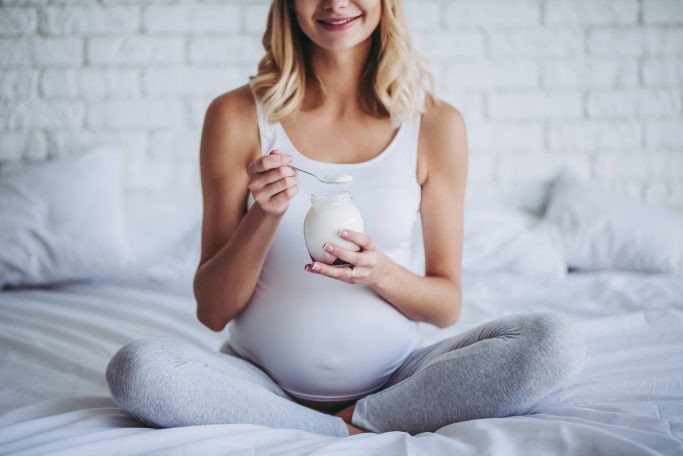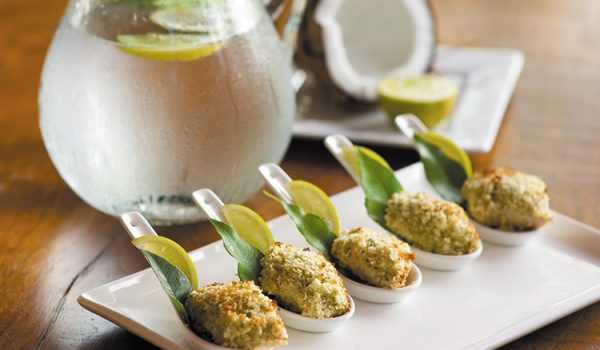A healthy pregnancy, the time leading up conceiving your baby and indeed after you have given birth, are likely to be the most exciting time of your life. It’s also a time where it’s vital to ensure both you and your baby are getting your RDIs of essential nutrients, advises Dr Raewyn Teirney, leading fertility specialist and gynaecologist.
“Your pregnancy journey actually begins a good three to four months prior to conceiving, when you are trying for your precious baby,” she reveals. “During this time, it is important for both you and your partner to be as ‘fertility fit’ as possible – to maximise your chances of falling pregnant, as well as to ensure the good health of both you and your baby.” Dr Raewyn’s soon-to-launch fertility app can also help you track your daily intake of nutrients to ensure you enjoy a healthy pregnancy.

Lifestyle Tweaks To Support A Healthy Pregnancy
This is the time to give up unhealthy lifestyle choices such as smoking, drinking too much alcohol, taking drugs or eating unhealthily. it’s also a great time to ensure you are getting enough exercise and that your body is functioning optimally.
“Your first step should be to see your GP for a general check up and conversation about any prescription meds you may be taking, or any underlying conditions you may have, such as diabetes,” advises Dr Raewyn. “You should also ask your GP for a referral to a gynaecologist who can do an overall health check and ensure you are indeed what fertility specialists refer to as ‘fertility fit”.
“Part of this is getting your correct daily intake of essential nutrients for your own health, as well as the healthy development of your baby throughout pregnancy, during breastfeeding and beyond.
Start Taking Folate Before You Start Trying To Ensure A Healthy Pregnancy And Baby
“Folate is absolutely essential to promote the healthy development of your baby’s neural tube (brain and spinal cord) and a healthy pregnancy,” advises Dr Raewyn. Your little one’s brain and spinal cord begins to develop even before you get those two lines on your pregnancy test!
It’s pretty common for women to be naturally low in folate, so fertility specialists recommend taking prenatal supplements that include folate at least three months, but ideally six, months prior to conception.
“Folic acid is important for the closure of the baby’s neural tube in early pregnancy and prevents conditions like Spina Bifida,” reveals Dr Raewyn.
Folate can be found in lentils, legume beans, green leafy vegetables (the darker, the better), avocados and oranges. However, most medical and fertility specialists recommend a supplement, no matter how healthy your diet may be.
Iodine
“Iodine supports the metabolism and assists with fetal brain development,” states Dr Raewyn. “Both the World Health Organization (WHO) and the Royal Australian and New Zealand College of Obstetricians and Gynaecologists (RANZCOG) recommend all women thinking about a healthy pregnancy, or trying to conceive should take a vitamin supplement containing both folic acid and iodine.
“The National Health and Medical Research Council recommends taking a daily pregnancy vitamin that includes 500 mcg of folic acid and 150 mcg of iodine. For men, studies have emphasised the importance of antioxidants to maintain healthy sperm and reproductive health. To assist with sperm health and function men can improve their anti-oxidant intake with a daily supplement of anti-oxidants. These include Zinc, Selenium, Lycopene, Folic acid, Garlic, Vitamins C, E, and D.”
Magnesium
A study by Advanced Biomedical Research found that during pregnancy and breastfeeding, pregnant women who supplemented with magnesium had less complications in their pregnancy. The study concluded that a woman who’s breastfeeding or pregnant could need as much as 1000mg of magnesium per day.
Magnesium has been found to reduce cramps which are very common during pregnancy and research has shown it will lessen the strength of Braxton Hicks contractions, which is extremely helpful during childbirth.
While magnesium is an essential mineral for all of us there are some other specific functions it performs when during pregnancy. It’s used to maintain healthy blood sugar levels in the body and it works together with calcium to help build baby’s healthy teeth and bones. It also regulates cholesterol and heartbeat in Mum-to-be. While magnesium is relatively east to get through food (just a few servings daily of magnesium rich foods – nuts, seeds, whole grains, beans, leafy vegetables, milk, yogurt and fortified foods) will suffice), many of us are actually low in this essential mineral, in which case a supplement can be useful.
Oral supplements can assist, however applying trans-dermally, as a cream, can often be more palatable for people, especially during pregnancy. Just the simple act of massage is an act of self care and a wonderful way to connect with your body and your baby at this precious time. Then there’s the added bonus that you’re massaging essential moisture into your skin throughout your pregnancy, which may help warn off stretch marks.
Director of Elektra Magnesium, Sandy Sanderson prefers the cream as it contains 15 percent magnesium chloride (food grade), infused in a complex blend of rich plant oils and butters, with essential fatty acids and fat soluble vitamins providing some buffering and skin barrier protection.
Be careful when breastfeeding though, as baby should not be ingesting the cream. “Don’t use the cream on the nipple area where your baby is feeding, as it’s not supposed to be ingested orally,” Sandy warns. “It’s best to lubricate and condition the nipple area with an edible vegetable oil and wait until this is fully absorbed before feeding.”
Zinc
“Zinc is an essential trace element important for rapid cell division and growth during pregnancy,” says Dr Raewyn.” Your zinc demands increase during pregnancy and lactation, so if you are low in zinc prior to conception, it will be harder for you to adequately meet the requirements to support the rapid growth of your baby.
Zinc can be found in myriad foods like oysters, beef, chicken, eggs, fish, milk, cheese, cashews, legumes such as chickpeas, and seeds!
Vitamin D
There is some indication that low vitamin D levels can influence the development of Type 1 Diabetes Mellitus (T1DM), an autoimmune condition, in your baby after birth. T1DM is where the body does not produce enough, or no insulin to take the sugars from the bloodstream into the cells of the body to use for energy. Studies show a rich vitamin D intake leading up to, and during pregnancy, can reduce the risk of your baby developing T1DM later in life.
“Emerging evidence suggests it may also be instrumental in hormonal balance, ovulation, egg development, and embryo quality, especially if you are deficient in anything else. Check your Vitamin D with your GP and load up on fortified eggs, salmon and tuna and a little sunshine ever day (don’t forget your SPF).”
Ingesting healthy fats helps your body absorb vitamin D more readily, so check you are getting some extra virgin olive oil, avocado, oily fish, nuts and seeds daily.
Vitamin B12
Vitamin B12 is a water soluble vitamin that is instrumental in maintaining a health brain and nervous system function. “Deficiency in Vitamin B12 may cause difficulty in conception, as inadequate levels can cause changes in the blood that affect egg development and ovulatory function,” says Dr Raewyn.
“B12 is readily available in any animal-based foods such as meat, poultry, fish, eggs and milk, as well as fortified milk alternatives like soy milk. For those women who follow a vegan diet – supplementation is necessary as there are no plant-based sources of B12. Speak to your GP to check your current levels and a dietitian for the best supplement regime.
Iron
“Iron is vital for for women, especially those trying to conceive,” says Dr Raewyn. “Research looking at 92 studies assessing the relationship between maternal iron anaemia and pregnancy outcomes found that a woman’s daily prenatal intake of iron improves the birth weight of your baby.
“Avoiding iron deficiency before becoming pregnant can make it easier to maintain iron stores, especially when you reach your third trimester where your iron needs increase by almost double (from 18 mg per day to 27 mg per day). These iron stores will be used to produce more blood, which will be provided to your growing baby.”
Calcium
Calcium is vital to help strengthen your growing baby’s rapidly-developing bones and teeth. It also boosts muscle, heart and nerve development, and let’s not forget, it remains as important as ever for you to be getting your RDI daily for your own teeth and bones throughout pregnancy. The World Health Organization (WHO) advises that pregnant women take up to 1200mg per day of calcium.









